Bonfires have long been a traditional way to dispose of garden waste, celebrate special occasions, or simply enjoy the warmth and ambience of an outdoor fire. However, while bonfires can be enjoyable for some, they can also pose challenges and concerns for neighbours living nearby. Maybe you are wondering if you can have bonfires before 7pm or after?
The smoke, odour, and potential health hazards associated with bonfires can significantly impact the quality of life of those nearby.
Although there is no specific law regarding if you can have bonfires before 7pm, be mindful of your neighbours. The Environmental Protection Act 1990 states that bonfires shouldn’t create a nuisance to your neighbours, i.e. from the smoke or smell. It’s neighbourly to inform your neighbours in advance, preventing inconveniences like hanging out their washing.
Even though there are not any laws governing specific times you are allowed to have a bonfire, there are specific regulations and laws in place to govern the use of bonfires. These regulations are designed to strike a balance between allowing individuals to enjoy their outdoor space and ensuring the well-being and comfort of their neighbours.
Familiarity with these regulations is essential to avoid potential conflicts and legal repercussions.
By understanding the UK bonfire regulations, you can ensure that your activities comply with the law and take appropriate measures to minimise any negative impact on your neighbours.
The purpose of this blog is to provide you with valuable information and practical guidance on the topic of bonfires before 7pm, specifically in the UK context.
I will delve into the regulations surrounding bonfires, explore common concerns raised by neighbours, and provide useful tips on how to avoid conflicts and maintain relationships with those living nearby.
Stay tuned as I cover the key aspects of bonfire regulations in the UK, discuss potential neighbour disputes, and provide actionable steps for avoiding conflicts and resolving issues amicably.
Let’s create a better understanding of bonfires before 7pm and foster positive neighbourly relationships in our neighbourhood.
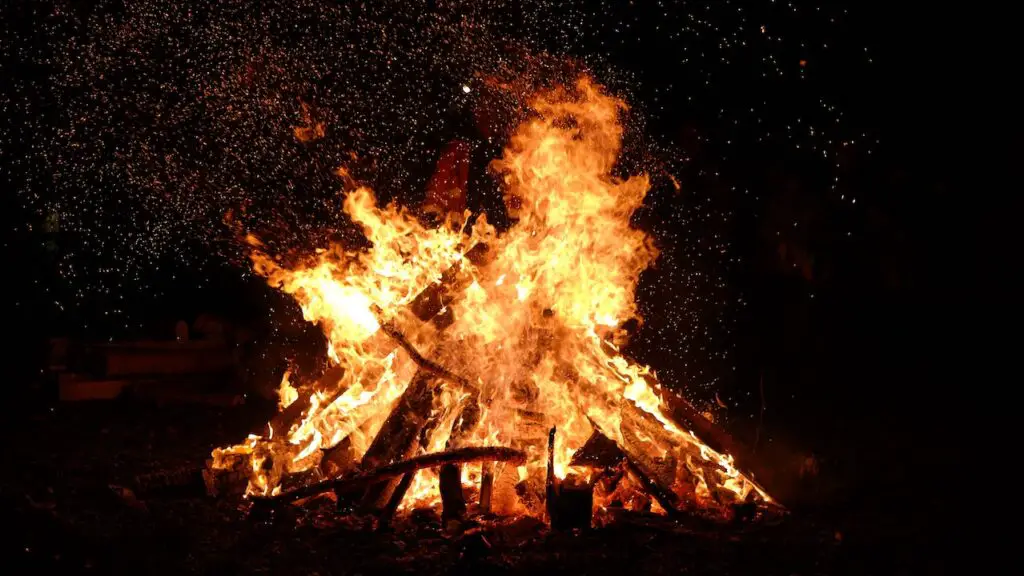
Bonfires and Neighbour Disputes
Common concerns raised by neighbours regarding bonfires before 7pm or anytime
When it comes to bonfires before 7pm or at any time, neighbours often express specific concerns that can contribute to disputes.
Here is a list of common concerns raised by neighbours regarding bonfires:
- Smoke and Odour: Neighbours may be bothered by the smoke and strong odours emitted from bonfires, which can affect the air quality and the enjoyment of their own properties. Your neighbours may have to close their windows or avoid putting their washing out because of the smell.
- Health Hazards: Bonfires can release pollutants and toxins into the air, potentially causing respiratory issues or aggravating existing health conditions.
- Property Damage: Neighbours may worry about potential property damage caused by bonfires, such as flying embers or heat affecting nearby structures, fences, or vegetation.
- Noise Disturbance: The noise generated by bonfires, including conversations or accompanying activities, can cause disturbances and disrupt the peace and quiet in the neighbourhood.
- Environmental Impact: Some neighbours may be concerned about the environmental impact of burning waste materials or the use of non-renewable resources for bonfires.
- Safety Risks: Neighbours may express concerns about the safety risks associated with bonfires, such as fire spreading uncontrollably or inadequate supervision leading to accidents.
Bonfire Rules and Laws in the UK
In the United Kingdom, there are specific laws and rules in place to govern the use of bonfires. These regulations aim to protect the environment, public health, and the well-being of individuals.
While the bonfire rules and laws may vary slightly across different regions, there are general guidelines that apply throughout the country.
Environmental Protection Act 1990
The Environmental Protection Act 1990 is a crucial piece of legislation that addresses various environmental concerns, including the regulation of bonfires.
Under this act, it is an offence to cause a nuisance to others through the emission of smoke, fumes, or gases from domestic or trade premises.
The act empowers local authorities and environmental health officers to take action against individuals who create excessive smoke or odour that affects their neighbours.
Local bylaws and restrictions imposed by local councils
In addition to the Environmental Protection Act 1990, local councils often have their own bylaws and restrictions regarding bonfires.
These bylaws may specify the times when bonfires are permitted, the materials that can be burned, and any additional requirements such as notifying neighbours or obtaining permits.
It’s important to familiarise yourself with the specific bylaws in your area to ensure compliance. You can find out more on your local council’s website.
Potential consequences of non-compliance with bonfire regulations
Failure to comply with bonfire regulations can have serious consequences.
Local authorities have the power to issue warnings, fixed penalty notices, or even prosecute individuals who repeatedly breach the regulations.
The penalties can include fines, injunctions, or other legal actions.
Moreover, non-compliance can strain neighbourly relationships and lead to disputes, which may require mediation or involve further legal proceedings.
By following these regulations, you can minimise the impact of bonfires on your neighbours and contribute to a healthier and more pleasant living environment.
In the next sections, we will delve into specific concerns raised by neighbours and explore ways to avoid disputes and find alternative solutions to bonfires before 7pm.

When Do Bonfires Create a Statutory Nuisance?
In the UK, a bonfire can be considered a statutory nuisance if it substantially interferes with the use or enjoyment of another person’s property, or if it poses a risk to public health or the environment.
The specific criteria for determining a statutory nuisance can vary slightly depending on the local authority and relevant regulations. However, some common factors considered include:
- Frequency and Duration: If the bonfires occur frequently and persist for extended periods, causing regular disruption to neighbours, it may be deemed a statutory nuisance.
- Smoke and Odour: Excessive smoke, strong odours, or pollutants emitted from the bonfire that significantly impact neighbouring properties or cause harm to public health can be considered a statutory nuisance.
- Health and Safety Risks: Bonfires that pose a risk to public safety, such as those located too close to buildings, trees, or flammable materials, may be regarded a statutory nuisance.
- Time of Burning: Burning at inappropriate times, particularly during sensitive periods like evenings or weekends when people are more likely to be affected or disturbed, can contribute to the determination of a statutory nuisance.
If you believe that a bonfire in your vicinity qualifies as a statutory nuisance, it is advisable to contact your local council’s environmental health department.
They will assess the situation, investigate the complaint, and take appropriate actions to address the issue in accordance with the applicable regulations.
There is further information on the GOV.UK website that you can read here.
How Do I Report a Neighbour Bonfires or Burning Rubbish?
If your neighbours are having regular bonfires that are creating a nuisance, then you can contact the Environmental Health Department to make a complaint about the bonfires or the burning of rubbish.
You should note that for bonfires to be a statutory nuisance, your neighbours must be having regular bonfires, one or two won’t be sufficient to make a complaint. You must be able to show that you can’t enjoy your property because of the bonfires, or there is a health and safety concern.
Step 1 – Gather evidence:
Collect evidence of the incidents, including dates, times, and any relevant details. Take photographs or videos if possible, as visual evidence can strengthen your report.
Step 2 – Identify the appropriate council:
Determine which local council is responsible for your area. You can find this information on the council’s website or by contacting your local authority.
Step 3 – Contact the council’s environmental health department:
Reach out to the environmental health department of your local council. You can typically find their contact information on the council’s website or by calling the main council switchboard.
Step 4 – Make a formal complaint:
Provide a detailed account of the issue, including the evidence you have gathered. Clearly explain the nature of the problem, emphasising the burning of rubbish or constant bonfires, and how it is negatively impacting you and the community.
Step 5 – Follow the council’s procedures:
The council may have specific procedures for handling complaints related to burning rubbish or bonfires. Follow their instructions and provide any additional information or evidence they request.
Step 6 – Request anonymity if needed:
If you have concerns about your identity being disclosed to your neighbour, discuss your preference for anonymity with the council. They will advise you on the available options and confidentiality measures.
Step 7 – Follow up on the complaint:
Keep a record of your communication with the council, including the date and time of your report. Follow up if necessary to inquire about the progress of the investigation or any actions being taken.
By reporting the issue to the council, you are providing them with the necessary information to address the problem and enforce relevant regulations.
It’s important to be patient and allow the council time to investigate and take appropriate action.
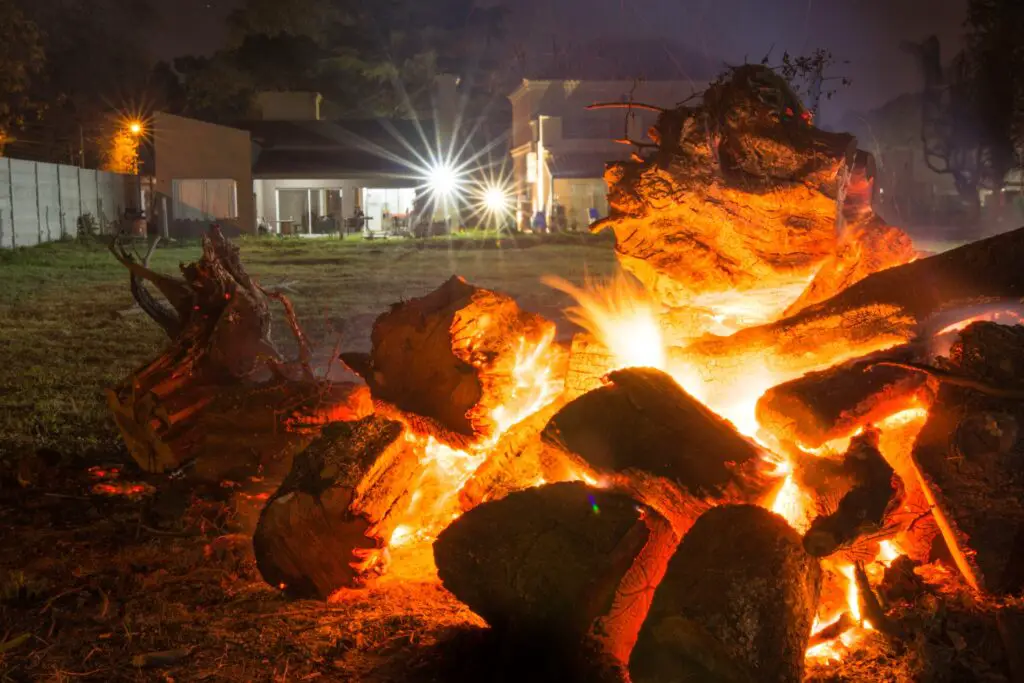
Steps to Avoid Neighbour Bonfire Nuisance Dispute
If you want to have bonfires but don’t want to cause any tension with neighbours, then here are some tips to follow:
Bonfire Etiquette
Follow bonfire etiquette to reduce your chances of annoying your neighbours:
- Educate Yourself: Familiarise yourself with the bonfire regulations specific to your area. Understand the permitted times, materials, and any other restrictions outlined in the regulations.
- Smoke Management: Proper smoke management is essential to minimise the impact on neighbours. Burning dry materials, avoiding the use of damp or green waste, and ensuring adequate ventilation can help reduce smoke production.
- Odour Control: Using appropriate materials and avoiding the burning of items that produce strong odours can help mitigate the impact on neighbours. Consider alternatives such as composting or recycling where possible.
- Health and Safety Measures: It’s important to prioritise health and safety when engaging in bonfires. Avoid burning items that release toxic fumes, and ensure that the bonfire is a safe distance from buildings and flammable materials.
- Keep a Safe Distance: Ensure that the bonfire is a safe distance from structures, fences, trees, and other potential hazards.
- Supervision and Containment: Always supervise the bonfire and have measures in place, such as a fireproof container or fire pit, to contain the fire and prevent the spread of embers.
Communicating with neighbours about planned bonfires
- Inform in Advance: If you plan to have a bonfire before 7pm (or after), it is considerate to inform your neighbours beforehand. Let them know the date, time, and duration of the bonfire, and address any concerns they may have.
- Seek Feedback: Encourage your neighbours to express their concerns or preferences regarding the bonfire. This allows you to take their opinions into account and find mutually agreeable solutions. This decreases the chance of your neighbour having to make a complaint to the council.
Exploring alternatives to bonfires, such as composting or recycling
- Composting: Consider composting garden waste instead of burning it. Composting is an environmentally friendly alternative that can help reduce waste and provide nutrient-rich soil for your garden.
- Recycling: Properly separate and dispose of recyclable materials to minimise the need for burning them. Check with your local council for recycling guidelines and collection services.
Using bonfire alternatives like chiminea or fire pits
- Chimineas: A chiminea is a freestanding outdoor fireplace that can contain fires and direct the smoke upwards. It can provide a controlled and contained fire experience while reducing smoke dispersion.
- Fire Pits: Fire pits are designed to contain fires and provide a focal point for outdoor gatherings. They can help reduce the impact of smoke and provide a safer alternative to open bonfires.
Consideration for sensitive periods, such as weekends or holidays
- Be Mindful of Timing: Avoid having bonfires during sensitive periods like weekends, holidays, or evenings when people may be more likely to spend time in their gardens or have windows open.
- Special Circumstances: Take into consideration any events or circumstances in your community that might make bonfires less appropriate or desirable, such as celebrations, festivals, or periods of high air pollution.
By following these steps, you can demonstrate consideration for your neighbours’ well-being and minimise the potential for disputes.
Ultimately, fostering open communication and exploring alternative options can help create a more harmonious living environment for everyone involved.
You may also be interested in the following:
- Neighbour’s Garden Full of Dog Poo UK: What to Do
- My Neighbour Has Killed My Hedge: Is It Criminal Damage?
- ‘Neighbour’s Balcony Overlooking My Garden’: What Can You Do?
- My Neighbour’s Garden Is An Eyesore! What Can I Do?
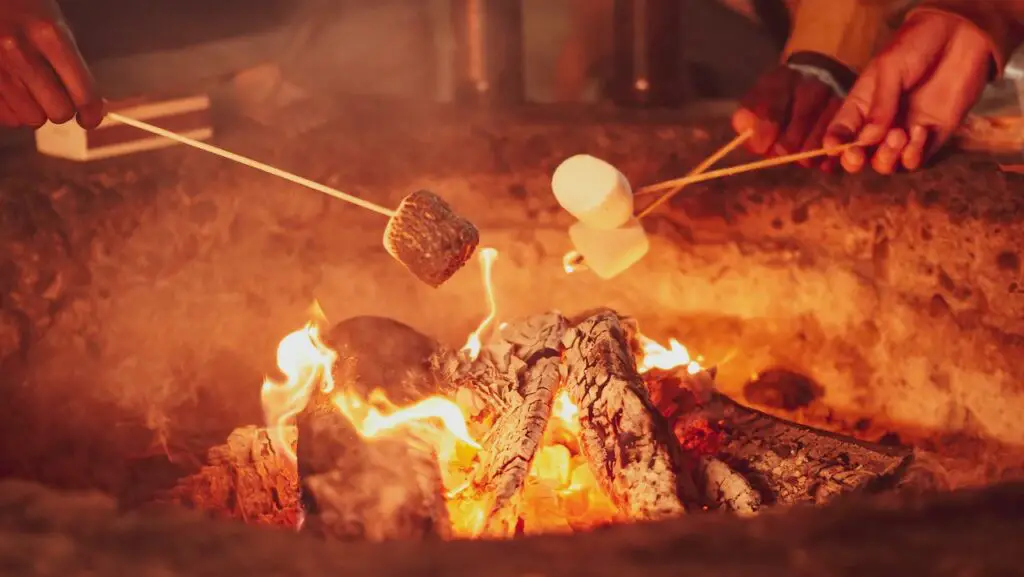
Resolving Neighbour Bonfire Disputes
If you are having issues with a neighbour’s bonfire that is creating a nuisance, then you can follow the steps below to resolve the situation:
Step 1 – Communication with neighbours
- Initiate Conversation: Approach your neighbours with a willingness to listen and understand their concerns. Express your own concerns in a respectful manner and work together towards finding common ground.
- Seek Compromise: Be open to compromise and consider alternative solutions that address both parties’ interests. Finding a middle ground can help resolve the dispute amicably.
- Mediation: Consider engaging in mediation services, which provide a neutral third party to facilitate communication and help find mutually acceptable solutions. Mediation can be a valuable tool for resolving conflicts without resorting to legal action.
Step 2 – Involvement of local authorities and environmental health departments
- Report Concerns: If direct communication and mediation do not yield satisfactory results, you can involve the relevant local authorities or environmental health departments. They have the authority to enforce bonfire regulations and address complaints related to excessive smoke, noise, or other bonfire-related issues.
- Provide Evidence: When reporting concerns to local authorities, gather any relevant evidence, such as photographs, videos, or written documentation, to support your claim and demonstrate the impact of the dispute on your quality of life.
Step 3 – Legal actions and seeking legal advice when necessary
- Last Resort: Legal action should be considered as a last resort when all other attempts at resolution have been exhausted. It can be a costly and time-consuming process, so it is advisable to explore alternative dispute resolution methods first.
- Seek Legal Advice: If the dispute escalates and legal action becomes necessary, consult with a solicitor or legal professional who specialises in neighbour disputes. They can guide on the legal aspects of the situation and help protect your rights and interests.
Remember, resolving neighbour disputes is typically most effective when approached with open communication, respect, and a willingness to find mutually agreeable solutions.

FAQs About Neighbour’s Bonfires
Can I burn wood in my garden UK?
You can burn wood in your garden in the UK, but it’s important to do so responsibly.
Burn dry, untreated wood to minimise excessive smoke and unpleasant odours.
Avoid burning treated wood or household waste, as it is illegal and can release harmful emissions. Consider your neighbours and avoid burning when the wind may blow smoke towards their properties.
Use alternatives like chimineas or fire pits to contain the fire and reduce smoke spread. Check local bylaws for any specific regulations.
Be considerate, communicate with your neighbours, and prioritise their well-being and the environment.
Can I complain about a neighbour’s bonfire?
To complain about a neighbour’s bonfire in the UK, gather evidence of the incidents causing a nuisance, check local regulations, and try discussing the issue with your neighbour first.
If the problem persists, contact your local council or environmental health department, providing evidence and explaining the impact of the bonfire.
Follow the council’s complaint procedure and consider seeking mediation or community resources if needed. Aim for a mutually agreeable solution while maintaining a good relationship with your neighbour, if possible.
By following these steps, you can raise your concerns and seek resolution for the bonfire issue.
What time can you have a fire in your garden UK?
There are no specific laws in the UK that dictate the exact times when you can have a fire in your garden. However, it’s important to be considerate of your neighbours and avoid causing a nuisance.
It is generally recommended to avoid having fires late at night or early in the morning, as these times are more likely to disturb others.
Additionally, be mindful of any local bylaws or restrictions that may apply in your specific area.
To maintain positive relationships with your neighbours, it’s advisable to communicate with them about your plans and take their concerns into account regarding the timing of fires in your garden.
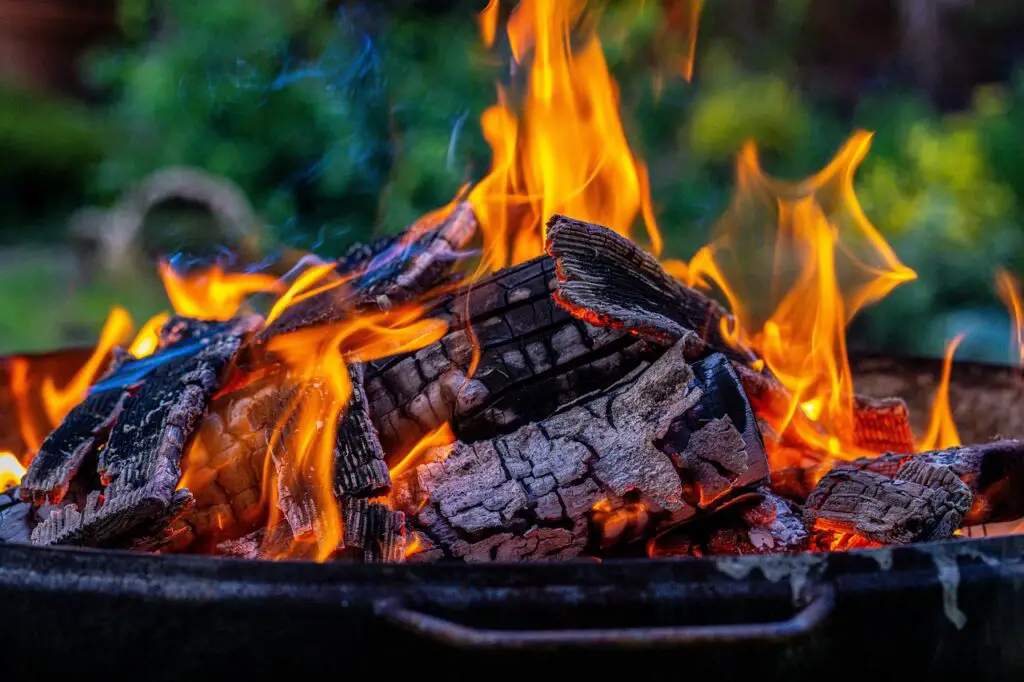
Final Thoughts About Bonfires Before 7pm
In conclusion, understanding bonfire regulations in the UK is crucial for maintaining harmonious neighbourly relationships and avoiding disputes.
I hope this blog answered your query ‘Can I have bonfires before 7pm‘ and the laws on bonfires during the day or night.
Familiarising yourself with the laws and regulations, such as the Environmental Protection Act 1990 and local bylaws, helps ensure compliance and reduces the negative impact of bonfires on your neighbours.
By adhering to these regulations, you contribute to a healthier environment and promote a sense of community.
Open communication and respect towards neighbours are essential in addressing concerns related to bonfires.
By initiating constructive conversations, seeking compromise, and being mindful of the impact on others, you can work towards resolving disputes and maintaining positive relationships.
Local authorities, mediation services, and community resources can provide valuable guidance and support in resolving conflicts related to bonfires.
Additionally, consulting with legal professionals can help navigate complex legal matters if disputes escalate. Take advantage of these resources to find the most suitable solutions for your specific case.

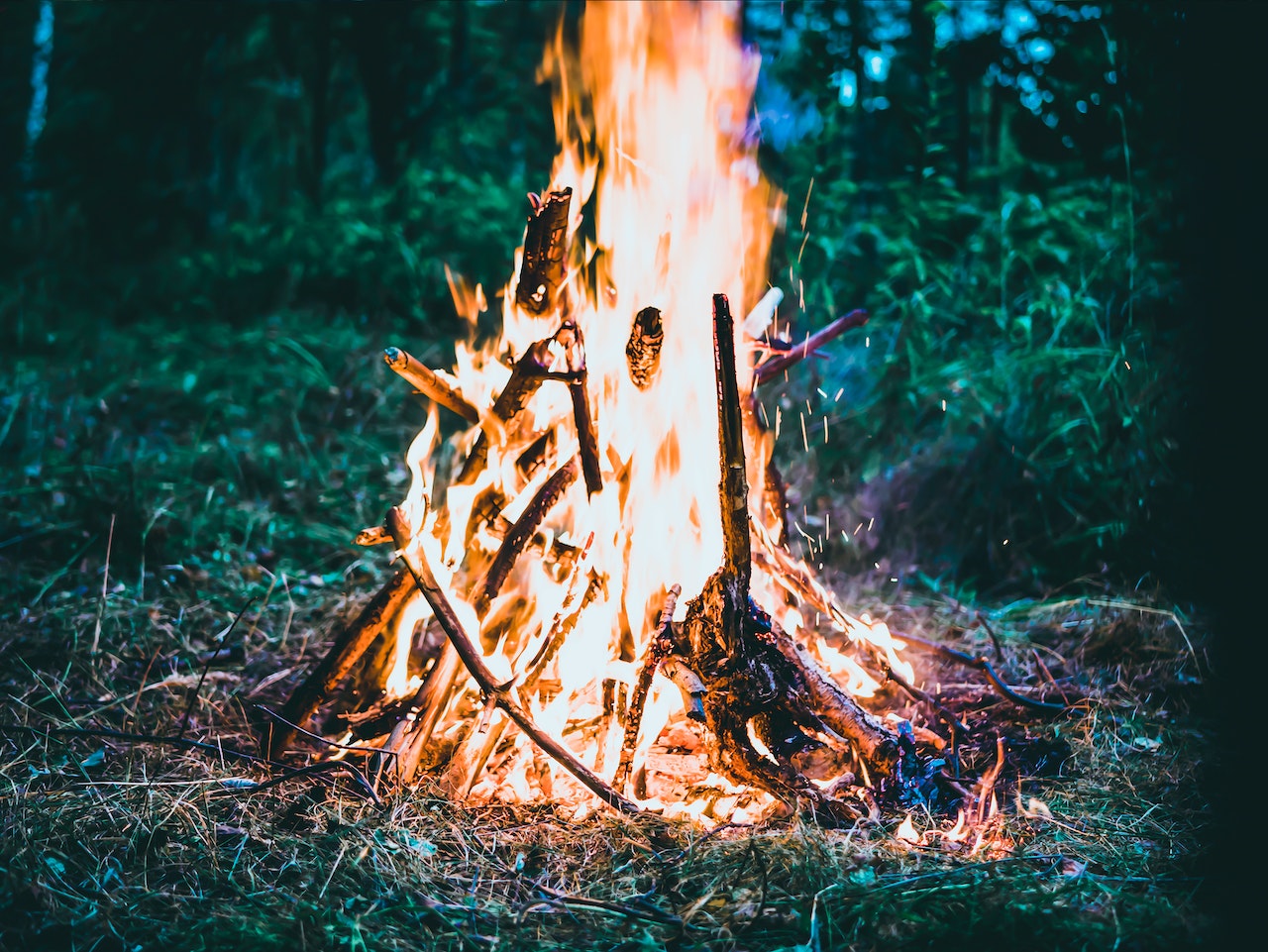



Leave a Reply